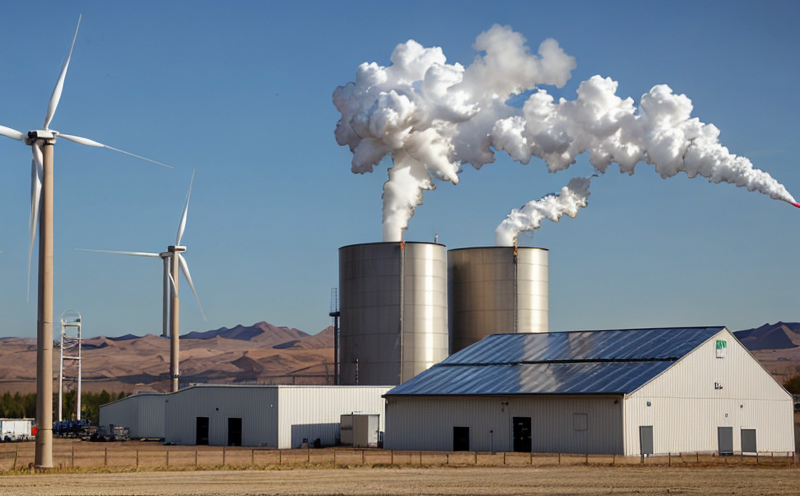ISO 14040 Life Cycle Assessment Testing in Energy Systems
The International Organization for Standardization (ISO) defines ISO 14040 as a standard that provides guidance on the life cycle assessment (LCA) of products, processes, and services. In the realm of energy systems, this standard is particularly crucial for understanding the environmental impact of various renewable energy technologies throughout their lifecycles.
Life Cycle Assessment (LCA) encompasses all stages of a product's lifecycle from raw material acquisition to post-consumer disposal or recycling, with an emphasis on quantifying and evaluating emissions and other impacts. This approach is essential in the energy sector as it helps identify areas for improvement in terms of sustainability and efficiency.
For example, when assessing wind turbines, the LCA would consider not only manufacturing processes but also operational phases such as electricity generation, maintenance activities, decommissioning processes, and end-of-life recycling. Similarly, solar panels undergo similar scrutiny to ensure they contribute positively to environmental goals over their entire lifecycle.
The primary objective of conducting an ISO 14040 compliant LCA in energy systems is to provide a comprehensive overview of the environmental aspects associated with each stage of the product's life cycle. By doing so, stakeholders can make informed decisions about optimizing resource use, reducing waste generation, and minimizing adverse effects on human health and ecosystems.
Real-world applications of this methodology include:
- Renewable Energy Technologies: Evaluating solar panels, wind turbines, geothermal systems, etc., for their environmental footprint across all lifecycle stages.
- Policies & Regulations Compliance: Ensuring adherence to local and international standards regarding sustainable practices within the energy industry.
- R&D Projects: Supporting innovation efforts aimed at creating more environmentally friendly solutions in the field of renewable energies.
Given its importance, it's no surprise that many organizations involved in developing or deploying new forms of clean power rely heavily on ISO 14040 compliant LCAs. These assessments play a vital role in shaping strategies to enhance sustainability performance while meeting regulatory requirements.
In conclusion, implementing an effective ISO 14040 LCA strategy ensures that all aspects influencing the environmental impact of energy systems are considered thoroughly and transparently. This proactive approach fosters continuous improvement towards greener alternatives within the broader framework of sustainable development goals.
Eurolab Advantages
EuroLab, your trusted partner in specialized testing services for energy systems, offers unparalleled expertise and state-of-the-art facilities dedicated to supporting clients across diverse sectors. With a strong emphasis on delivering accurate results swiftly, we ensure that every project receives personalized attention from our experienced team of professionals.
- Comprehensive Testing Capabilities: Our laboratory boasts extensive capabilities encompassing chemical analysis, mechanical testing, electrical characterization, thermal imaging, among others—all tailored specifically for the unique requirements of energy systems.
- Precision & Reliability: Leveraging cutting-edge technology and rigorous quality control measures, EuroLab guarantees precise measurements and repeatable outcomes. This precision is crucial given the stringent nature of environmental regulations governing emissions standards.
- Expertise in Regulatory Compliance: Stay ahead of changing legal landscapes by partnering with us—our deep understanding of relevant international standards like ISO 14040 enables seamless integration into existing compliance frameworks.
By choosing EuroLab for your testing needs, you gain access to a network of highly skilled experts who stay abreast of emerging trends and best practices. Together, let's drive forward sustainable solutions that benefit both present and future generations.
Quality and Reliability Assurance
The quality and reliability assurance measures at EuroLab are designed to meet the highest industry standards, ensuring consistent accuracy across all projects. From initial consultation through final report delivery, we maintain strict adherence to internationally recognized guidelines such as ISO 14040.
- ISO Certification: Our laboratory maintains certifications under various international standards including ISO 17025 for technical competence in testing and calibration laboratories.
- Continuous Improvement: Regular audits and reviews help us identify areas for enhancement, ensuring our processes remain aligned with evolving best practices.
- Data Integrity & Traceability: Every measurement result is meticulously documented, allowing easy retracing of data points should discrepancies arise later on.
Achieving these standards requires ongoing investment in personnel training and equipment upgrades. At EuroLab, we pride ourselves on fostering an environment where continuous learning and adaptation are encouraged. This commitment translates directly into enhanced service delivery for all clients.
Environmental and Sustainability Contributions
Conducting ISO 14040 compliant LCAs plays a pivotal role in advancing environmental stewardship within the energy sector. By identifying hotspots early on, these assessments enable targeted interventions aimed at reducing overall carbon footprints.
- Material Selection: Evaluating different materials used in manufacturing renewable energy components helps pinpoint those with lower embodied emissions.
- Operational Efficiency: Assessments during operation phases highlight opportunities for improving energy conversion efficiencies and minimizing losses.
- End-of-Life Considerations: Planning for responsible disposal or recycling ensures minimal waste contribution to landfills post-decommissioning.
The insights gained from these analyses contribute significantly towards developing more sustainable alternatives that align with global climate targets. Moreover, they support compliance efforts required by regulatory bodies worldwide.





